Strictly Personal
Ditch victim mentality, blaming colonialism, By Wale Akinyemi
Published
11 months agoon
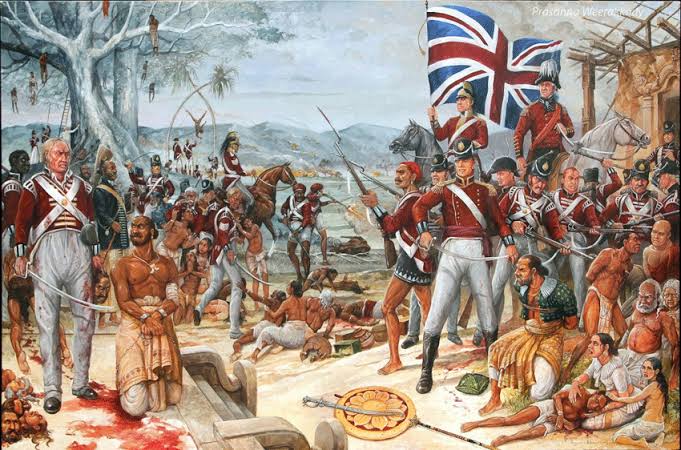
After the coronation of King Charles III, one performance stood out for me — the Nigerian superstar, Tiwa Savage. It was a moment of immense pride to witness her name in the spotlight, captivating the world. Tiwa’s stellar performance showcased her remarkable talent, poise, and composure. Every aspect of her performance, including the iconic green dress — symbolic of Nigeria’s colour — left an indelible impression. It is an unforgettable moment widely discussed in Nigerian mainstream and social media.
What makes this performance intriguing is the division it has created. Opinions are split between those who appreciate Tiwa and her performance, and those opposing it.
Detractors argue that she should not have performed at the coronation, considering the atrocities committed by the colonial establishment against her people and our ancestors. They say these are the very individuals who exploited and sold us into slavery, as well as those responsible for the nation’s turmoil. While these arguments may be rooted in some degree of historical fact, interpretation can be subjective.
Let’s simplify this. Africa has the largest membership in the Commonwealth. Despite our grievances about those who wronged us, we still answer and show up when they call. Why? Because we rely on their aid and support. If we are going to talk about pride, it should be all-round and not selective.
The embassies of the colonial nations on the continent are brimming with individuals applying for visas to visit and/or settle in these countries. And as some argue against Tiwa’s presence, thousands desperately seek to secure visas to go to these nations. Why yearn to visit the lands of our ancestors’ oppressors?
Truth is, we inflict more harm upon ourselves than any harm caused by colonialism. It has been over 60 years since our independence and must take responsibility and move forward, rather than continually dwelling on past grievances.
In examining the socio-economic landscape of Nigeria, it becomes increasingly apparent that our self-imposed transgressions have inflicted far greater harm than the historical era of colonialism. I do not seek to absolve colonialists of their actions, but from fact, it is time to confront the unvarnished truth.
How can super wealthy African leaders – among the wealthiest people on Earth preside over some of the poorest nations on the planet? It is more confounding to witness our leaders beseech the international community for financial assistance while parading opulence. How can we not see this? What critical piece of the puzzle are we missing here?
Continually laying blame solely on the colonialists for our predicament is an exercise in futility. It is imperative we reassess our mindset and discard the inclination to assign blame externally. With someone to blame, we evade accountability and remain in denial – as we have done these past six decades.
To bring about meaningful change in Africa, we must transcend this collective mindset. Our retrogressive thinking, the blame game we incessantly engage in, and our acceptance of mediocrity are the crux of our challenges. Let us align our minds with our resources. Let us get over our appetite for things we do not produce and let production and conversion of raw materials (including human resources) from one form to another be at the centre of our thought processes.
One disconcerting truth: Nigerian leaders, both military and political, have embezzled an astounding $600 billion from our nation since gaining independence. This amount eclipses all the aid and loans procured by the country, exacerbating its downward spiral. It is crucial to acknowledge that this reprehensible act was not perpetrated by external forces but by our very own hands.
So, to accuse Tiwa Savage of not being patriotic because she attended and gave a stellar performance at the coronation is an argument rooted in ignorance.
Wale Akinyemi is the founder of The Street University; Email: Wale@thestreetuniversity.com
You may like
-


Nigeria destined to become major global economy under Tinubu— VP Shettima
-


Nigeria’s central bank insists depleting external reserves not due to Naira defence
-


IMF predicts Nigeria’s inflation to drop to 18% by 2026
-


Air Peace, capitalism and national interest, By Dakuku Peterside
-
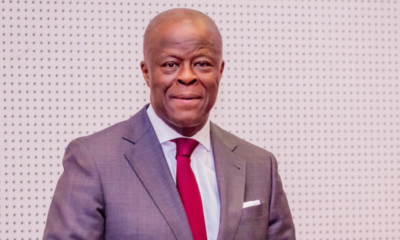

Nigeria’s finance ministry unveils system to monitor tax exemptions
-
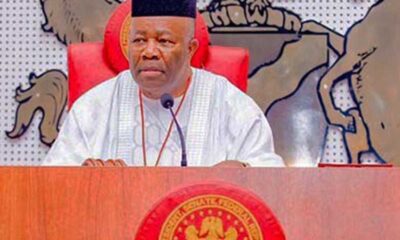

Nigeria: Senate President wants police rid of bad officers
Strictly Personal
Air Peace, capitalism and national interest, By Dakuku Peterside
Published
3 days agoon
April 16, 2024
Nigerian corporate influence and that of the West continue to collide. The rationale is straightforward: whereas corporate activity in Europe and America is part of their larger local and foreign policy engagement, privately owned enterprises in Nigeria or commercial interests are not part of Nigeria’s foreign policy ecosystem, neither is there a strong culture of government support for privately owned enterprises’ expansion locally and internationally.
The relationship between Nigerian businesses and foreign policy is important to the national interest. When backing domestic Nigerian companies to compete on a worldwide scale, the government should see it as a lever to drive foreign policy, and national strategic interest, promote trade, enhance national security considerations, and minimize distortion in the domestic market as the foreign airlines were doing, boost GDP, create employment opportunities, and optimize corporate returns for the firms.
Admitted nations do not always interfere directly in their companies’ business and commercial dealings, and there are always exceptions. I can cite two areas of exception: military sales by companies because of their strategic implications and are, therefore, part of foreign and diplomatic policy and processes. The second is where the products or routes of a company have implications for foreign policy. Air Peace falls into the second category in the Lagos – London route.
Two events demonstrate an emerging trend that, if not checked, will disincentivize Nigerian firms from competing in the global marketplace. There are other notable examples, but I am using these two examples because they are very recent and ongoing, and they are typological representations of the need for Nigerian government backing and support for local companies that are playing in a very competitive international market dominated by big foreign companies whose governments are using all forms of foreign policies and diplomacy to support and sustain.
The first is Air Peace. It is the only Nigerian-owned aviation company playing globally and checkmating the dominance of foreign airlines. The most recent advance is the commencement of flights on the Lagos – London route. In Nigeria, foreign airlines are well-established and accustomed to a lack of rivalry, yet a free-market economy depends on the existence of competition. Nigeria has significantly larger airline profits per passenger than other comparable African nations. Insufficient competition has resulted in high ticket costs and poor service quality. It is precisely this jinx that Air Peace is attempting to break.
On March 30, 2024, Air Peace reciprocated the lopsided Bilateral Air Service Agreement, BASA, between Nigeria and the United Kingdom when the local airline began direct flight operations from Lagos to Gatwick Airport in London. This elicited several reactions from foreign airlines backed by their various sovereigns because of their strategic interest. A critical response is the commencement of a price war. Before the Air Peace entry, the price of international flight tickets on the Lagos-London route had soared to as much as N3.5 million for the economy ticket. However, after Air Peace introduced a return economy class ticket priced at N1.2 million, foreign carriers like British Airways, Virgin Atlantic, and Qatar Airways reduced their fares significantly to remain competitive.
In a price war, there is little the government can do. In an open-market competitive situation such as this, our government must not act in a manner that suggests it is antagonistic to foreign players and competitors. There must be an appearance of a level playing field. However, government owes Air Peace protection against foreign competitors backed by their home governments. This is in the overall interest of the Nigerian consumer of goods and services. Competition history in the airspace works where the Consumer Protection Authority in the host country is active. This is almost absent in Nigeria and it is a reason why foreign airlines have been arbitrary in pricing their tickets. Nigerian consumers are often at the mercy of these foreign firms who lack any vista of patriotism and are more inclined to protect the national interest of their governments and countries.
It would not be too much to expect Nigerian companies playing globally to benefit from the protection of the Nigerian government to limit influence peddling by foreign-owned companies. The success of Air Peace should enable a more competitive and sustainable market, allowing domestic players to grow their network and propel Nigeria to the forefront of international aviation.
The second is Proforce, a Nigerian-owned military hardware manufacturing firm active in Rwanda, Chad, Mali, Ghana, Niger, Burkina Faso, and South Sudan. Despite the growing capacity of Proforce in military hardware manufacturing, Nigeria entered two lopsided arrangements with two UAE firms to supply military equipment worth billions of dollars , respectively. Both deals are backed by the UAE government but executed by UAE firms.
These deals on a more extensive web are not unconnected with UAE’s national strategic interest. In pursuit of its strategic national interest, India is pushing Indian firms to supply military equipment to Nigeria. The Nigerian defence equipment market has seen weaker indigenous competitors driven out due to the combination of local manufacturers’ lack of competitive capacity and government patronage of Asian, European, and US firms in the defence equipment manufacturing sector. This is a misnomer and needs to be corrected.
Not only should our government be the primary customer of this firm if its products meet international standards, but it should also support and protect it from the harsh competitive realities of a challenging but strategic market directly linked to our national military procurement ecosystem. The ability to produce military hardware locally is significant to our defence strategy.
This firm and similar companies playing in this strategic defence area must be considered strategic and have a considerable place in Nigeria’s foreign policy calculations. Protecting Nigeria’s interests is the primary reason for our engagement in global diplomacy. The government must deliberately balance national interest with capacity and competence in military hardware purchases. It will not be too much to ask these foreign firms to partner with local companies so we can embed the technology transfer advantages.
Our government must create an environment that enables our local companies to compete globally and ply their trades in various countries. It should be part of the government’s overall economic, strategic growth agenda to identify areas or sectors in which Nigerian companies have a competitive advantage, especially in the sub-region and across Africa and support the companies in these sectors to advance and grow to dominate in the African region with a view to competing globally. Government support in the form of incentives such as competitive grants ,tax credit for consumers ,low-interest capital, patronage, G2G business, operational support, and diplomatic lobbying, amongst others, will alter the competitive landscape. Governments and key government agencies in the west retain the services of lobbying firms in pursuit of its strategic interest.
Nigerian firms’ competitiveness on a global scale can only be enhanced by the support of the Nigerian government. Foreign policy interests should be a key driver of Nigerian trade agreements. How does the Nigerian government support private companies to grow and compete globally? Is it intentionally mapping out growth areas and creating opportunities for Nigerian firms to maximize their potential? Is the government at the domestic level removing bottlenecks and impediments to private company growth, allowing a level playing field for these companies to compete with international companies?
Why is the government patronising foreign firms against local firms if their products are of similar value? Why are Nigerian consumers left to the hands of international companies in some sectors without the government actively supporting the growth of local firms to compete in those sectors? These questions merit honest answers. Nigerian national interest must be the driving factor for our foreign policies, which must cover the private sector, just as is the case with most developed countries. The new global capitalism is not a product of accident or chance; the government has choreographed and shaped it by using foreign policies to support and protect local firms competing globally. Nigeria must learn to do the same to build a strong economy with more jobs.
Strictly Personal
This is chaos, not governance, and we must stop it, By Tee Ngugi
Published
1 week agoon
April 10, 2024
The following are stories that have dominated mainstream media in recent times. Fake fertiliser and attempts by powerful politicians to kill the story. A nation of bribes, government ministries and corporations where the vice is so routine that it has the semblance of policy. Irregular spending of billions in Nairobi County.
Billions are spent in all countries on domestic and foreign travel. Grabbing of land belonging to state corporations, was a scam reminiscent of the Kanu era when even public toilets would be grabbed. Crisis in the health and education sectors.
Tribalism in hiring for state jobs. Return of construction in riparian lands and natural waterways. Relocation of major businesses because of high cost of power and heavy taxation. A tax regime that is so punitive, it squeezes life out of small businesses. Etc, ad nauseam.
To be fair, these stories of thievery, mismanagement, negligence, incompetence and greed have been present in all administrations since independence.
However, instead of the cynically-named “mama mboga” government reversing this gradual slide towards state failure, it is fuelling it.
Alternately, it’s campaigning for 2027 or gallivanting all over the world, evoking the legend of Emperor Nero playing the violin as Rome burned.
A government is run based on strict adherence to policies and laws. It appoints the most competent personnel, irrespective of tribe, to run efficient departments which have clear-cut goals.
It aligns education to its national vision. Its strategies to achieve food security should be driven by the best brains and guided by innovative policies. It enacts policies that attract investment and incentivize building of businesses. It treats any kind of thievery or negligence as sabotage.
Government is not a political party. Government officials should have nothing to do with political party matters. They should be so engaged in their government duties that they literally would not have time for party issues. Government jobs should not be used to reward girlfriends and cronies.
Government is exhausting work undertaken because of a passion to transform lives, not for the trappings of power. Government is not endless campaigning to win the next election. To his credit, Mwai Kibaki left party matters alone until he had to run for re-election.
We have corrupted the meaning of government. We have parliamentarians beholden to their tribes, not to ideas.
We have incompetent and corrupt judges. We have a civil service where you bribe to be served. Police take bribes to allow death traps on our roads. We have urban planners who plan nothing except how to line their pockets. We have regulatory agencies that regulate nothing, including the intake of their fat stomachs.
We have advisers who advise on which tenders should go to whom. There is no central organising ethos at the heart of government. There is no sense of national purpose. We have flurries of national activities, policies, legislation, appointments which don’t lead to meaningful growth. We just run on the same spot.
Tee Ngugi is a Nairobi-based political commentator
EDITOR’S PICK


‘Reconsider your anti-people policies, they are causing hardship, insecurity in Nigeria’— PDP tells Tinubu
Nigeria’s main opposition party, the Peoples Democratic Party (PDP), has called on President Bola Tinubu to consider what it calls...


Top European, Asian clubs on alert as Super Eagles keeper set to make contract decision
Some top clubs in Europe and Asia have been put on alert as Super Eagles and Chippa United goalkeeper, Stanley...


IMF says South Africa needs to do more to cut spending, lower debt-to-GDP ratio
A top official from the International Monetary Fund has revealed that South Africa needs to do more to cut spending...


Burkina Faso expels 3 French diplomats over ‘subversive activities’
According to a letter quoted by Reuters on Thursday, three French diplomats have been sent back to France by Burkina...


Nigeria’s MAX partners Ghana’s Kofa in e-bike financing deal
Nigeria’s electric vehicle solutions provider, MAX, has announced striking a partnership deal with Ghana’s innovator in energy networks, Kofa, that...


Zambia asks EU to help strengthen its democratic initiatives ahead of 2026 elections
The Zambian government has called on the European Union (EU) to help in strengthening democratic initiatives in the country as...


Nigeria destined to become major global economy under Tinubu— VP Shettima
Nigeria’s Vice President, Kashim Shettima, has predicted that the country is destined to become a major economic force in the...


Nigeria’s central bank insists depleting external reserves not due to Naira defence
According to the Central Bank of Nigeria (CBN), the big drop in the country’s foreign exchange reserves was not due...


African Guarantee Fund partners Nordic Development Fund to launch green finance in Nigeria
The African Guarantee Fund (AGF) has teamed up with the Nordic Development Fund (NDF) to launch a green finance fund...
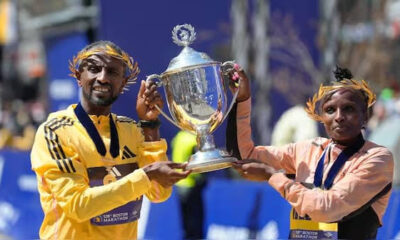

Ethiopia’s Lemma, Kenya’s Obiri give Africa double podium finish at Boston Marathon
Ethiopia’s long distance runner, Sisay Lemma, and Kenyan female marathon sensation, Hellen Obiri, teamed up to give Africa a double...
Trending
-

 Sports2 days ago
Sports2 days agoEthiopia’s Lemma, Kenya’s Obiri give Africa double podium finish at Boston Marathon
-

 Culture2 days ago
Culture2 days agoDavido’s ‘Unavailable’ achieves milestone with 100 million views on YouTube, Spotify
-

 Metro2 days ago
Metro2 days agoZambia: Many feared injured as UPND, PF supporters clash in court
-
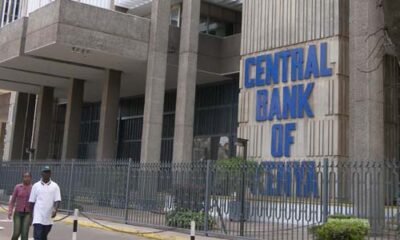
 VenturesNow2 days ago
VenturesNow2 days agoInvestors’ wealth drops by $968 million on Nairobi Securities Exchange


